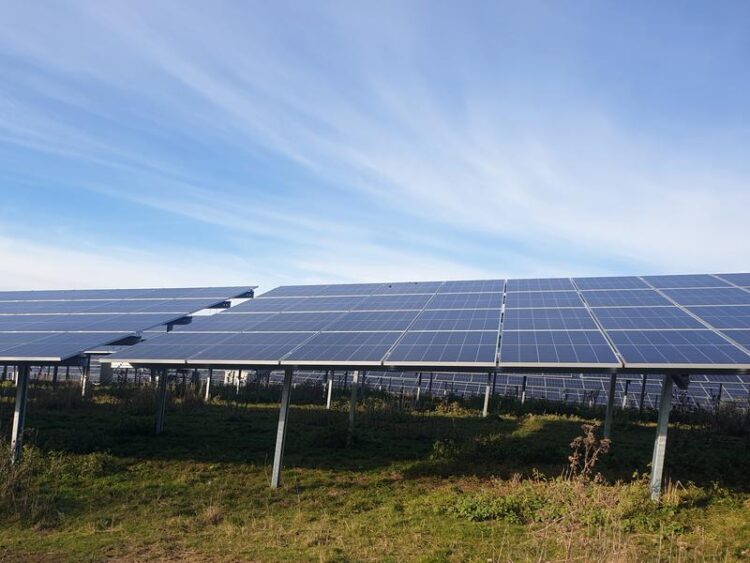Fewer power grid losses due to intelligent control

The expansion of photovoltaic systems is causing current power lines to reach their limits.
Hochschule Landshut
A project at Landshut University of Applied Sciences is developing a control system for electricity storage in order to reduce power grid losses and support the energy transition.
In the course of the necessary energy transition, it is important for the use of renewable sources of energy to be increased. The huge increase in the number of photovoltaic systems, however, means that existing power lines are now reaching their limits, as peak loads are overloading the power grid. That means: the energy provided under optimal conditions could suddenly fizzle out, which is why the demand for energy storage systems is increasing.
One problem for operators, however, is that the individual storage concepts have different management systems and that no solution is yet available for the intelligent networking of the various storage systems. Moreover, it is not yet possible to consider the storage systems in the context of the current or future load on the grid, and to therefore control the power flows intelligently. This is where the new iGridControl research project at Landshut University of Applied Sciences steps in.
In cooperation with the companies DHYBRID Power Systems and CONPOWER, the research team led by Prof. Dr. Alfons Haber and Prof. Dr. Mona Riemenschneider intends to develop a big data-based, grid-wide control system, and to thereby reduce peak loads and grid losses. The Federal Ministry for Economic Affairs and Energy (BMWi) is supporting the project exclusively for Landshut University of Applied Sciences with total funding of 190,000 euros.
Lower investment costs for grid operators
The new technology could have considerable advantages for the grid operators, explains Haber: “To compensate for peak loads on local grids, the generation and storage systems would need to be massively expanded. This would result in high investment costs. However, it is already becoming apparent that the expansion of the distribution grids can’t keep up with the steadily increasing share accounted for by renewable energy.”
With the intelligent control of energy storage systems, the costs in the grid infrastructure could be significantly reduced. At the same time, the operators would be able to regulate the photovoltaic and wind power systems more flexibly, and therefore operate them more economically. This could, in turn, increase the security of the supply as well as the autonomy of the regional power grids.
Big data and machine learning
In the first step, the scientists plan to record the load conditions on the grids at measuring stations designed especially for this purpose. The researchers will then collate this measurement data with further metadata as well as with generator and consumer models, and develop an intelligent grid control system using big data analyses and machine learning. This can provide the control instructions for the power generators and storage systems. “We believe that at the lower and medium voltage levels, the market potential for such a technology is very high,” explains Haber, “after all, according to the current state of the art, no grid-wide metering systems with a control algorithm of this kind are yet available on the market.”
About the project
The iGridControl project will run until the end of March 2022, and is being carried out by Landshut University of Applied Sciences in cooperation with the companies DHYBRID Power Systems and CONPOWER Betrieb. The project managers are Prof. Dr. Mona Riemenschneider and Prof. Dr. Alfons Haber. The project is being funded by the Federal Ministry for Economic Affairs and Energy (BMWi).
Media Contact
All latest news from the category: Power and Electrical Engineering
This topic covers issues related to energy generation, conversion, transportation and consumption and how the industry is addressing the challenge of energy efficiency in general.
innovations-report provides in-depth and informative reports and articles on subjects ranging from wind energy, fuel cell technology, solar energy, geothermal energy, petroleum, gas, nuclear engineering, alternative energy and energy efficiency to fusion, hydrogen and superconductor technologies.
Newest articles

First-of-its-kind study uses remote sensing to monitor plastic debris in rivers and lakes
Remote sensing creates a cost-effective solution to monitoring plastic pollution. A first-of-its-kind study from researchers at the University of Minnesota Twin Cities shows how remote sensing can help monitor and…

Laser-based artificial neuron mimics nerve cell functions at lightning speed
With a processing speed a billion times faster than nature, chip-based laser neuron could help advance AI tasks such as pattern recognition and sequence prediction. Researchers have developed a laser-based…

Optimising the processing of plastic waste
Just one look in the yellow bin reveals a colourful jumble of different types of plastic. However, the purer and more uniform plastic waste is, the easier it is to…



